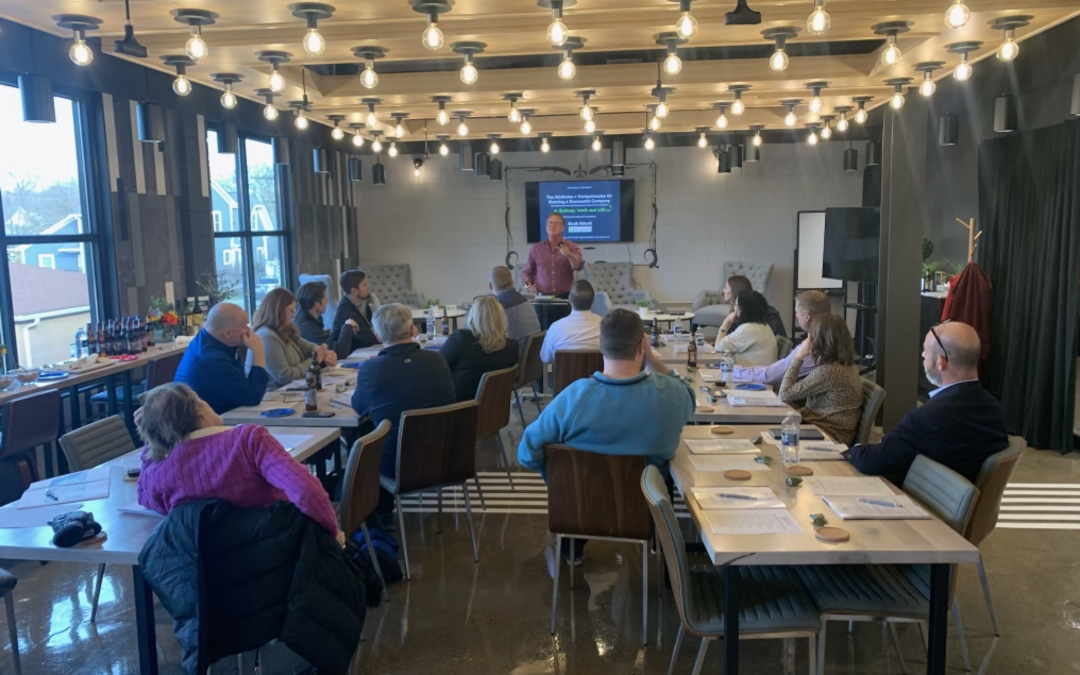From an interview that took place in Summer 2022
Everywhere Scott Abbott goes, he brings himself. That may seem like an obvious statement – after all, who goes anywhere without themselves? – but the truth is, most people walk into a room with the intent to bring whatever the situation needs from them at the time. Scott, on the other hand, brings exactly who he is and trusts the situation to either accept it or reject it, regardless of context or company.
He may not see it himself, but because of his unwillingness to conform, Scott is one of the people that everyone else orbits around when he walks into a room. That doesn’t mean he’s antisocial, though. “I’m really passionate about the virtues of being self-aware and self-sufficient, but also being others-oriented and working as a team,” he says. “How do we be the best versions of ourselves by ourselves, and do so with other people at the same time?”
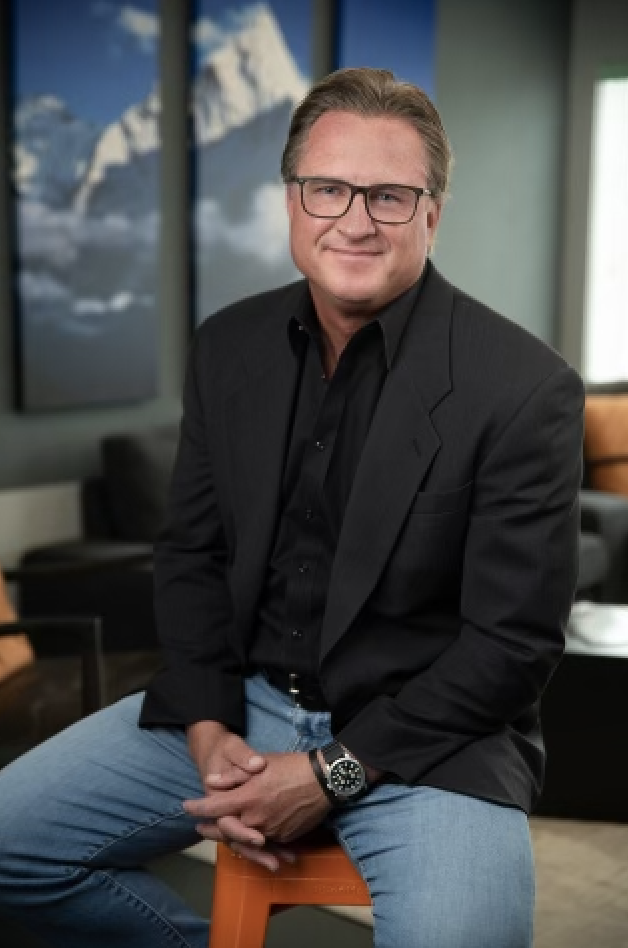
Scott’s self-reliance is a trait that comes from his childhood. As a kid, two of his only constants were himself and his family. The Abbotts frequently moved from place to place throughout the world. While Scott never had trouble making friends, he also never had the opportunity to grow deep roots in any particular place. To this day, he considers London his hometown, although he had many different homes in many different towns.
“I graduated from high school in Madrid, Spain. If you would have asked me back then if I thought I’d be living in Carmel, Indiana, I would have said ‘heck no’,” he admits. “But as I’ve gotten older, my desire to always be doing cool things in cool places is not as important to me as hanging out with good people, and having the confidence that where I live, and where I spend most of my time working, is real. Carmel is a good fit for me.”
As a younger man, though, Scott thrived on those cool things and cool places. His first job was in customer service for a SaaS company outside of Chicago. At 23, his company promoted him to outside sales in Indiana, then promptly fired him for starting a new company during his tenure with theirs. Undeterred, Scott moved to LA, where he grew his hair out, pierced his ear, and spent a lot of time playing volleyball on the beach.
Eventually, Scott returned to Indiana. He tried working for another tech company, but it didn’t work out for him, so he struck out on his own. Around the same time, he met his wife, Sherry, and decided to settle down and start a family in the Hoosier state. “I’m still figuring out what I want to be when I fully grow up,” he says. “I’ve started a handful of companies, failed at some, succeeded at some, and had a wonderful couple of decades of experience starting, supporting, coaching, nurturing, and investing in companies and their people.”
Throughout his journey, Scott has matured (“even though I have a lot of immaturity in me,” he notes) to care deeply about blending service and profit. Trying so many different things has helped him unearth the common purpose between all of his endeavors, and it isn’t his ROI. “I’ve always been a teacher at heart,” he says. “I’ve always wanted to be of help or service. Not to go all cliché, but I’ve heard that nobody on their deathbed says, ‘I wish I would have made more money.’ I don’t want to get to the end of my life and be disappointed in myself for not excelling at what I could control: helping other people, making an impact, and using my superpowers. I don’t need fancy cars and cities and homes. What I’m trying to do is give my best through the work that I do.”
It’s difficult to write about Scott without writing about said work. His professional endeavors are deeply tied to the person he is. “I’ll never retire,” Scott says. “A third of my life is working as a coach and facilitator, a third is my investments and other advisory work, and a third is hanging out with good people, and writing, and reading, sneaking in an afternoon nap, and working on a really bad golf game.” Instead of work-life balance, Scott prefers work-life integration, and has had the good fortune to be able to achieve it by creating businesses that revolve around how he likes to spend his time.
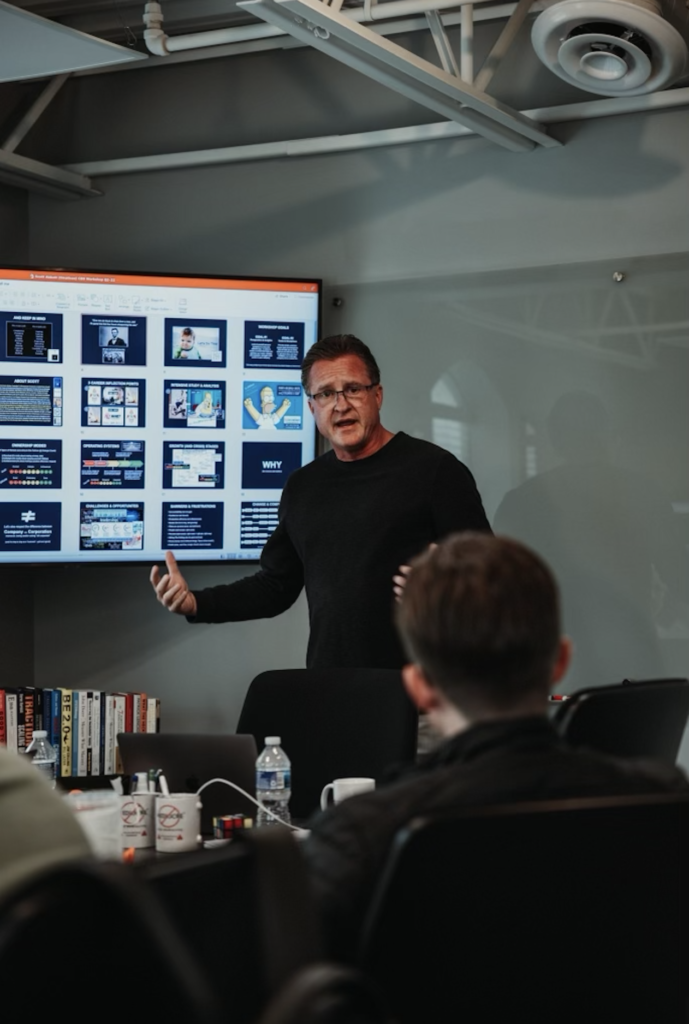
Counterintuitively, Scott maintains that the reason he can truly serve others is because he serves himself first. “I certainly am not selfless, and I do not encourage anybody to be selfless. You cannot be there for other people if you don’t take care of yourself,” he says. “This is almost where I’m an activist today. I see way too many people who say, ‘I can’t take care of myself because I’m too busy taking care of other people.’ I get that in theory, but if you do it to such a degree that you end up causing harm to your physical, mental, emotional, or spiritual health, then is that really the right thing to do?”
“I can be here for other people and still be committed to my own health, well-being, and continuous growth,” he adds. “My ability to help others is only because I’m not completely selfless.”
Scott advises his clients to follow something called the 80/20 rule; 80% “in”, 20% “on”. That means that 80% of the work week should be spent “in” the business, meaning the day-to-day responsibilities, and 20% of the work week should be “on” yourself and the people that make your work possible. That might mean coaching other people on your team, going for a run, hanging out with a friend who inspires you, listening to a podcast, or even taking a power nap.
Although he likes frameworks like the 80/20 rule, Scott innately distrusts any one system that claims to have all the answers to someone’s problems. “A lot of systems and books say to do it their way, and I don’t believe that. I think every methodology is inherently flawed. It didn’t know you when it was written, it was written in the past tense, and it literally is about them, not you.”
That’s not to say that books Scott loves, like Traction by Gino Wickman, are completely useless. He vouches for mixing and matching methods to fit your lifestyle. “I work from real data, live information, and the human beings and circumstances that are in front of me right now,” he explains. “But the world’s too dynamic for one-size-fits-all solutions.”
Systems can also act as a trap, Scott points out. One big issue he sees with entrepreneurs, oddly enough, is a fear of change. “People think what got them there will keep them there,” he warns. “Quite the opposite. That can make things get very ugly very fast.”
Scott accurately describes himself as a “voracious consumer.” He discovers new ways to innovate by taking in information. An avid reader and podcast listener, he also learns a lot from TED Talks and the great leaders he has encountered over the years. “Like everything, there’s a flipside to that,” he says. “When you have too much information, you’re always wondering who’s right.” The solution, he thinks, is a trusted group of advisors. “I think everyone should have a mentor, or mentors, or a circle of friends where they can gain input.”
One of Scott’s talents is categorizing the information he learns and disseminating it at the right time, to the right people. Through Straticos (created from the words “strategic” and “collaborators”), Scott helps business owners and leadership teams learn, implement, and benefit from a software-powered solution to help them run a great company. He also coaches his clients through both team workshops and one-on-one sessions. “All solutions come with Scott. And Scott’s not for everybody,” he says wryly, “but neither is anyone else. Tony Dungi is famous for being an angel, and that’s not me. But I’m also no Bobby Knight or Bill Bellichick.”
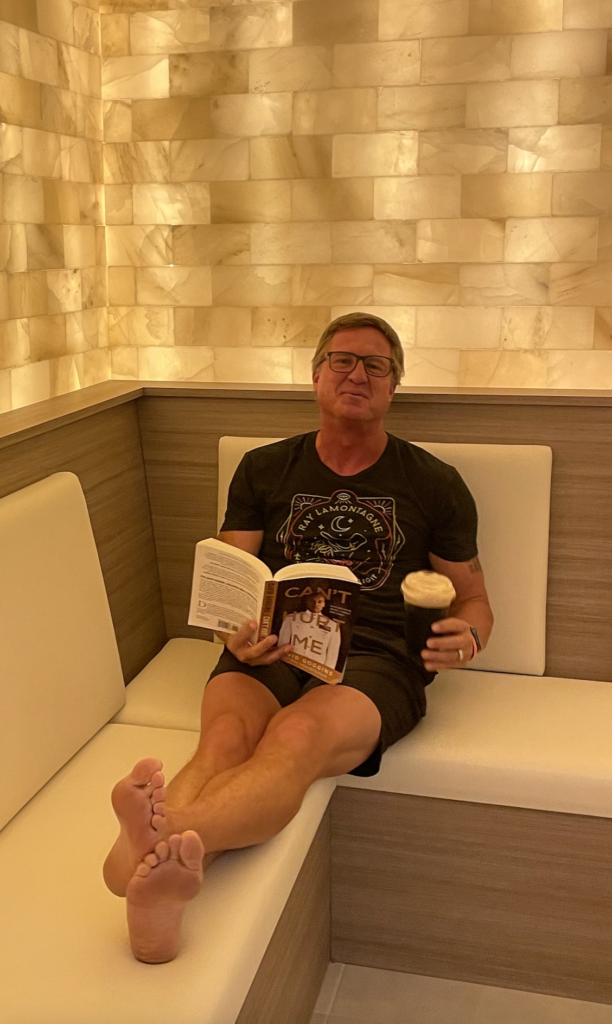
By knowing himself, Scott knows who he has the greatest power to help. His favorite leaders to work with have, as he says, “the right blend of ego and IQ. They’ve come here because they’ve done well, and now they need to call BS on themselves so they can do better.” He especially likes people who are willing to take action before they have all the facts, and hammer out the kinks along the way.
Above all, Scott is a mentor to his clients first, and a coach second. He knows his job is to build deep relationships first so that he doesn’t have to sugarcoat his advice. “That little awe between us is very powerful,” he explains. “If I can’t be real with you, I can’t help you. If someone looks to me like a vendor, like they’re paying me not to tell them what I really think, it won’t work. As a business owner, you’ve got to deal with things you don’t want to deal with.”
Luckily, Scott finds the greatest reward in the slow, consistent, daily grind of turning something good into something great. He doesn’t believe in instant gratification. To him, the end result means much more when you’ve worked your tail off to get there, and he loves watching people flourish in that process.
“There’s a goodness that happens before you achieve the results you’re looking for,” Scott explains. “You can feel it. It comes through peoples’ skin. It’s like magic, what happens when people are starting to become self-aware and comfortable. I get inspired by tangible proof that people are evolving in their confidence and humility.”
‘Progress over perfection’ is one of Scott’s favorite mantras, and he uses it often. “There’s a duality to improvement. You can simultaneously say ‘hey, things are getting better’ and ‘hey, things aren’t as good as I thought they were’.”
Scott may not always have had the words to express that concept, but it’s something he’s carried with him through his own darker days. “I’ve struggled with depression in the past,” he admits. “Words can knock you down, and sometimes it’s tough to get back up.” He agrees that mindset and effort is extremely important, but it isn’t what defines everything. “There’s more to success and enjoyment than just this theory of meritocracy,” he says. “Some people are just blessed and fortunate, and others have had bad circumstances.”
“Fortunately, when I hit my lowest, I knew not to stop,” he adds. “I’ve been morally, financially, and emotionally broke. And I knew that the only way to get out of it was to keep on walking, and sooner or later I’d catch a break. And you know what? I did.”
Scott’s advice for others going through challenging times is to begin by putting words to your fears. It diffuses their heaviness and makes them something you can plan to overcome. “Once you realize it isn’t this nameless pile of goo, you start asking yourself every morning what you can do today to influence the outcome you want. Name the problem. Own it. Wrestle it. Try not to let it get the better of you,” he advises. “For a lot of people, their lows are a much smaller percentage of their world than they realize.”
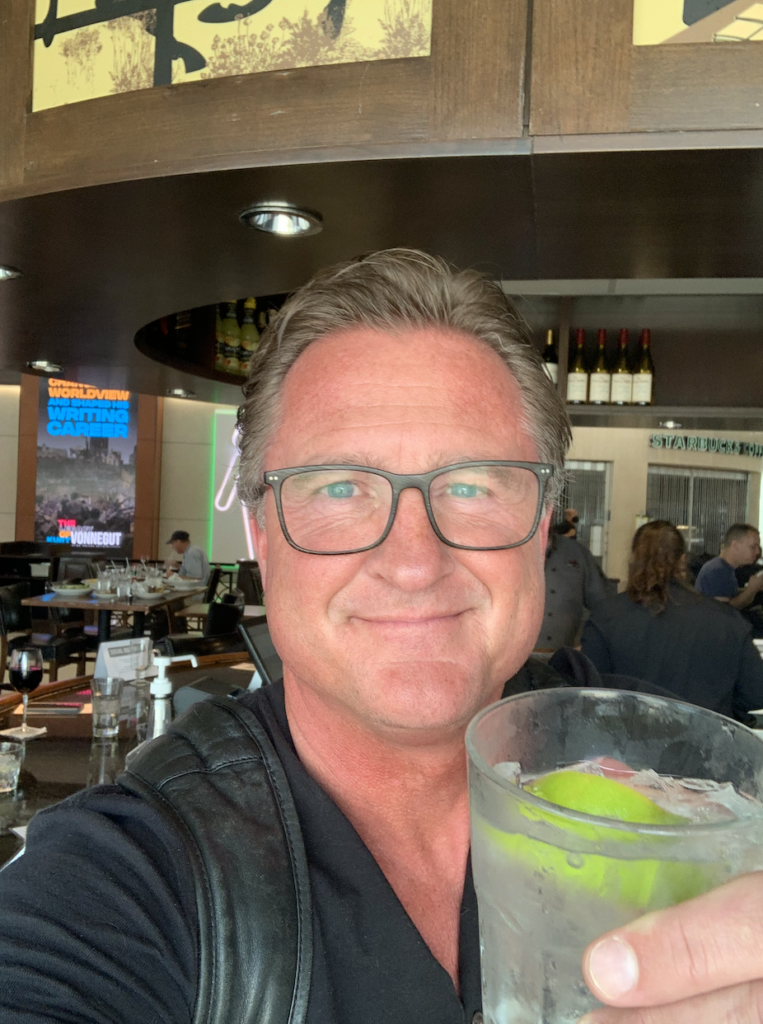
It may seem like Scott doesn’t believe in failure, only forward motion – but that isn’t the case, either. He considers failure to be an inevitable part of life. “I think it’s more important to learn how to not be so distraught and frustrated with failure,” he explains. “And don’t romanticize it, either. Avoid it if you can, but it isn’t fatal, just like success isn’t permanent.”
With the addition of frameworks, systems, and protocols, Scott knows mistakes can be minimized. “Bring your head and your heart, but also, if you can, bring your calculator,” he says. “Try to be the left brain and the right brain, as well as a soul and a body. Plan better, listen better, and embrace things you don’t love, like process and protocol.”
Thanks to implementing his own advice, Scott has found himself in a season of stability. He considers himself blessed to spend the majority of his time helping others. He recently moved out of his office in Carmel and into COHatch, down the street from his former address. In addition to all the work he does with companies, he is writing what will be his fourth and supposedly final book, alongside his son, Ethan; “Let’s be Independent Together”.
“I’m pretty passionate about the dynamics of the world today,” he says. “The cup is both half-full and half-empty. I think one of the biggest challenges we have is how to be the best version of ourselves, independently, while collaborating and communicating with other people. For me, today, my question is how to make all boats rise at the same time.”

